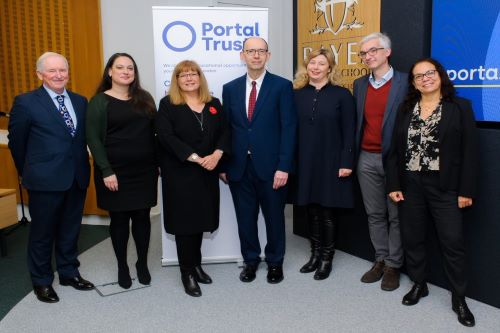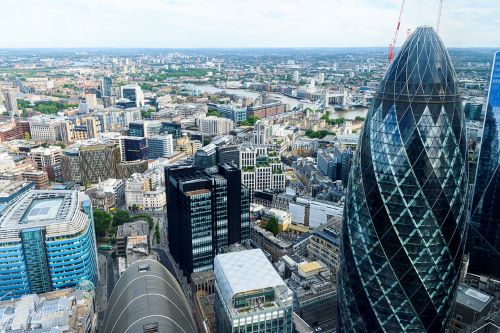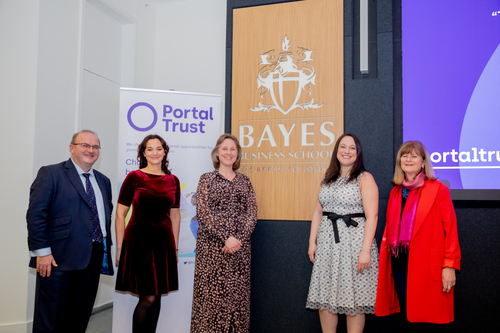Published
A Black woman who shattered several glass ceilings in the PR sector called for “a legally defined set of values” to encourage integration when she delivered the annual Portal Trust lecture at Bayes Business School (formerly Cass).
Colleen Harris, who was the first senior comms officer at both 10 Downing Street and the Royal Household before working for key equality bodies, acknowledged that her vision for an integrated society was based on personal experience and therefore “might not resonate with everyone”. The Portal Trust is an education charity supporting young people from disadvantaged backgrounds and communities, largely in London. It works with Bayes in delivering a programme of mentorship for local young people.
Welcoming guests to the lecture, the school’s Deputy Dean, Professor Barbara Casu, noted that Colleen had advised the Portal Trust on its decision to leave behind its previous title, the Sir John Cass Foundation, in 2021 because of its founder’s links with the slave trade. Bayes, she noted went through a similar process at the same time as the Cass Foundation had contributed significantly to the very building where the evening’s lecture was being held.
"I have to say that I’m excited by the theme of this evening’s lecture, not least as it ties in so well with the Bayes motto of ‘always learning’."

The case for agreed values
Emphasising the role education plays in bringing people together, Colleen said: “Without such real interaction there can be no real integration.”
Outlining her vision, Colleen said: “Everyone…(should sign) up to a single core set of values held in common and defined legally – including equality between people, the integrity of the person and freedom of expression; and when and where these core values conflict with ancestral cultural values, these core values must take precedence.
“Where should the balance lie between two extremes? On the one hand, old style cultural assimilation in which everyone is expected to discard their own heritage - ethnic, regional, linguistic - in favour of a single norm. On the other hand, a cringing abandonment of the core values and behaviours that distinguish democratic, liberal, modern Britain from other less diverse and open societies."
“This delicate balance changes all the time. In this country matters are complicated, because on these large questions of culture and behaviour we tend to avoid explicit statements of what is and isn't acceptable.”
Her vision of integration does not stem from any belief that her own record of breaking through barriers means the UK was a meritocracy without discrimination. While she enjoyed working in senior comms roles – in Downing Street during the Thatcher government and for the King when he was Prince of Wales – Colleen said she found it exhausting to be “the only (Black) one in the room”. That was one reason she moved to senior communications roles in more diverse organisations – including the former Commission for Racial Equality and its successor body, the Equality and Human Rights Commission.
An African-Caribbean boy born in the UK, she noted, is twice as like as likely to be jailed as he is to achieve a degree while almost no Gypsy or Traveller children achieve three A levels. For many Londoners, Colleen said, “life is still all too often solitary, poor, nasty, brutish and short”.
She continued: “The task for institutions like the Portal Trust and Bayes is to keep us on course for greater equality even as the demographic terrain around us continues to shift. The reality is that there are several barriers currently impeding successful integration. Some of them are straightforwardly about discrimination. Some of them are about class. Still others are systemic.”
The vision for integration she set out was her response to those barriers, Colleen said. Ever since the Romans arrived, London has adapted as the world changes, Colleen said, but now it and the UK and other European countries face particular challenges from globalisation.
“Our unique challenge lies in our imperial history. Globalisation means that we are increasingly colliding with our own past as those we previously colonised turn up here in the UK. This means that our approach to our multi-ethnic future cannot be the same as those newer nations.
“We are colliding with our past – but this time we are not the masters. We are, like all others in the West, having to negotiate our way through the management of migration essential to our economic prosperity. It isn’t a simple process.”
“Globalisation brings benefits for us, but at the same time, it changes what we mean by ‘us’, as many of those staying are not only from Commonwealth countries, but from places like China, the Middle East and eastern Europe.”
The particular issue at the moment, Colleen said, is the degree to which communities can cope with the change.
Education can break down barriers
“The challenge of integrating new and settled communities as they live together in the short and long term will continue to grow with ever-increasing globalisation. The global movement of people has not just increased but changed.
“There’s a job to do in making sure newcomers are welcomed and get the chance to see in practice what it’s like to be British. It is education – especially schools and universities – where we meet people who don’t have the same background as we do. That makes what the Portal Trust and other educational institutions do is not just a good way to help people pass exams – it makes it part of the glue that holds our society together.”
While much still needs to change, the openness and tolerance that allow the capital’s universities and schools to develop the scientists, artists and innovators of tomorrow is what make it a unique place, she said.
Colleen concluded: “The majority of us, regardless of our diversity and educational achievement know the freedoms, the lifestyle, and the mutual tolerance we enjoy here in London cannot be matched anywhere else in the world. Maybe that is what London can teach the world.”



